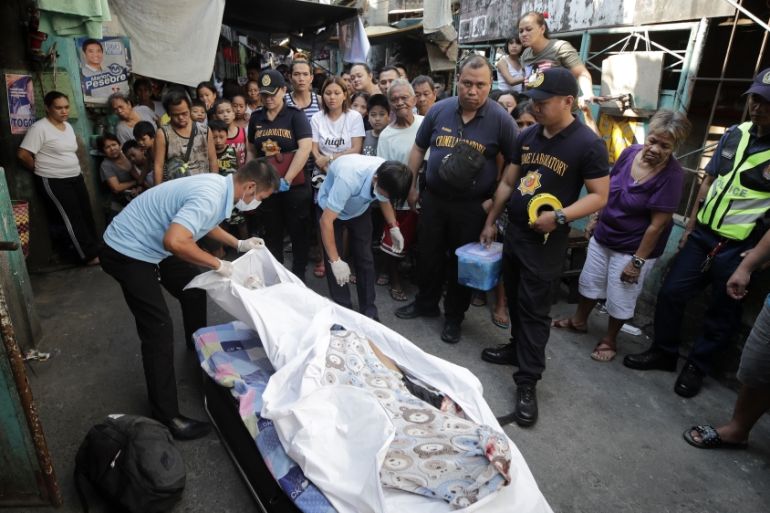Philippine authorities ‘getting away with murder’ in drug war
Amnesty International questions conflicting number of suspects killed as government highlights latest accomplishments.

The police and other anti-narcotics enforcement agencies continue to “get away with murder” in the Philippines, Amnesty International has said on Thursday, as the administration of President Rodrigo Duterte announced its latest performance report in the three-and-a-half year war on drugs.
Despite international criticism and threats of prosecution in the international criminal court, “the top leadership still has its marching orders to use killing as the centrepiece, and just letting the police and other law enforcement agencies get away with murder,” Wilnor Papa, a human rights officer at Amnesty International in the Philippines, told Al Jazeera.
Keep reading
list of 3 itemsUN to investigate deadly Philippines drug war
Philippines’ Duterte: ‘Kill those useless bishops’
In July, Amnesty called on the United Nations to investigate Duterte for alleged “crimes against humanity”.
Members of the UN Human Rights Council later voted in favour of a resolution directing human rights chief Michelle Bachelet to prepare a “comprehensive report” on the situation in the Philippines. The report is due in 2020.
Earlier on Thursday, the Philippine National Police and the Philippine Drug Enforcement Agency (PDEA) announced that an estimated 5,552 people had been killed during government operations between July 1, 2016, and November 30, 2019.
Activists say at least 27,000 people have been killed since Philippines’ President Rodrigo Duterte came to power in 2016.
Now the UN is preparing to demand an investigation into extrajudicial killings during his “war on drugs”.
These are the country’s death squads: pic.twitter.com/dD59RDJe1U
— AJ+ (@ajplus) July 9, 2019
During the same period, authorities conducted 151,601 anti-illegal drug operations and arrested 220,728 drug suspects including 8,185 “high value targets”.
The government also said 40.39 billion pesos ($796m) worth of methamphetamine have been seized by police.
Conflicting numbers raise questions
But the latest numbers of deaths released by the government raised questions about conflicting official data released previously, said Papa of Amnesty International.
On June 18, 2019, official data released by national police headquarters said that from July 1, 2016, to May 31, 2019, there had already been 6,600 drug suspects killed during police operations.
In December 2017, an annual report released by the Duterte administration said 3,967 “drug personalities” had been killed during police operations from July 1, 2016, to November 27, 2017.
Another 16,355 homicide cases – from July 1, 2016, to September 30, 2017 – were classified as “under investigation”.
Meanwhile, the Philippine Commission on Human Rights and other human rights advocates, said the number could be as high as 27,000 killed from the time Duterte was sworn into office on June 30, 2016, to June 2019.
|
|
A report published in March that quoted Philippine police spokesman, Colonel Bernard Banac, said there have been 29,000 people killed from July 1, 2016, to February 4, 2019.
Regardless of the numbers, no one has been made accountable for the killings, Papa said on Thursday.
“They said that policemen are being dismissed. But no one is being prosecuted for the crimes that they have committed,” he said.
One of the few cases that gained international attention and outrage in the Philippines was the murder of a 17-year-old high school student. A Philippine court sentenced three police officers in November 2018 to up to 49 years in jail for that crime.
This was the first case of what human rights advocates say was an extrajudicial killing carried out by state agents in Duterte’s war on drugs.
At the government press conference on Thursday, PDEA chief Aaron Aquino said “some governors” and “some congressmen” remain involved in the illegal drugs trade.
He added that major Chinese drug syndicates are operating in the Philippines, including the so-called Dragon Wu drug group.